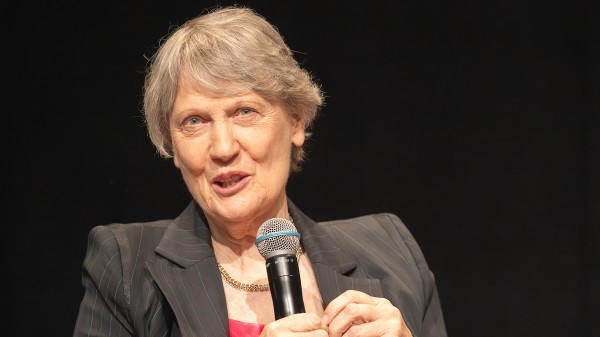Design and discovery
My PhD was just a wonderful journey. I found that in doing experiments I could make discoveries, and that was so enlightening.
Medical research is always portrayed to the public in terms of diseases and the search for cures and exciting new therapies. However, Professor Helen O’Neill admits that the process of research is tough and much more esoteric. It is the creative side of the endeavour that appeals to her most as a researcher.
Having spent many years experimenting with cells of the immune system, Helen humbly admits that her greatest strength lies in designing experiments. “To succeed in science one needs to be able to discover things, and that is something that I always found easy. Interpreting data, building ideas into discoveries, and writing about the findings in a way which inspires others, are aspects of research which I love the most.”
It is clear that Helen is extremely passionate about her work. “I feel very fortunate that I have been able to work during my entire career doing what I like and what I am good at.”
Growing up in Adelaide, Helen and her three siblings were always encouraged to be independent learners. “My parents were inspirational, so energetic and hard-working. I have huge respect for my mother who managed a full-time job and family, while still maintaining a sense of fun.”
“When I came through high school the government was encouraging students to pursue careers in science. Their intention was to build research capacity which was lacking in Australia at that time.”
Helen enrolled in a Bachelor of Science at Adelaide University in the early 1970s. “I went on to do genetics at honours level and really loved it,” she said. “The questions being asked at the time were so interesting, and of huge potential importance. That’s where my interest in research began.”
Helen then left Australia with her husband Terry who won a CSIRO postgraduate scholarship to study statistics at Stanford University in California. “Originally I was planning to study genetics at UC Berkeley. Then I realised that Berkeley was 70 miles from Stanford, and decided that was too hard.” Instead, Helen took a position at the Stanford University Medical Centre running a research lab where she worked with cultured heart cells.
“I learnt such a lot by watching what was going on in the medical centre,” she explains. “I learnt how to do research, how to do experiments, and how to sort out ideas.”
It was while working at Stanford that her life-long interest in immunology was piqued. “The immunology seminars were given by people like Len Herzenberg, Hugh McDevitt and Irv Weissman who worked at the top of the field. There were some big findings being made in a new, rapidly progressing field.”
After three years, Helen returned to Canberra where she decided to pursue her PhD and began the search for a suitable position. “I went to the John Curtin School of Medical Research (JCSMR), knocked on doors, and found a place in immunology. I started in 1977.”
In her element, Helen thrived during her PhD years. ”The School at that time was full of really enthusiastic people. Everything you needed was available – the materials, the animals. You didn’t have to budget or get a grant. I knew how to do research from my time at Stanford and very soon I had enough data to start writing my thesis. I loved writing, and eventually published 13 papers from that period.”
After completing her PhD in 1981, Helen was immediately appointed as a research fellow at JCSMR. “It was unheard of in those days,” she points out. “You always became a post doc first. I was always an independent person – the way I think, the way I prefer to work – so I saw it as a green light to work independently as a researcher.”
“I was pregnant when I started at JCSMR. I could write a book about the hurdles I had to go through to arrange leave! People were very accepting of me being pregnant in the workplace, but were nervous. They didn’t have the administrative framework or the policies to guide them. They had to work out what to do.”
“It was my own perseverance and the acceptance of people around me, which allowed me to succeed – but it was difficult. Nowadays it’s so straightforward. Maternity leave and other benefits for women are available and very liberal, and that’s how it should be.”
“I am sometimes asked how I managed a family along with a career in research. Mostly I decline to answer,” confesses Helen, with slight embarrassment. “Over the years I have come to realise that very few people are as determined as I am. Success was about jumping hurdles. There were many. I just had to keep finding the strength to leap over them, and some were huge.”
Over the next few years, Helen and family split their time between Canberra and California. “At the time, there was pressure for Australian researchers to gain overseas experience. We went back to Stanford several times by taking up fellowship offers to work with different people, to learn new skills, and to broaden our research interests.”
At this time, the offer of positions at Stanford weighed heavily. “We loved the area around Stanford, the work and the people and it took a long time to decide not to stay. We still have close ties with that part of the world.”
Helen continued at JCSMR before taking a position in the ANU School of Biochemistry and Molecular Biology with the Research School of Biology. Her work now focuses on the infinite therapeutic possibilities associated with adult stem cells, and considers the spleen as a site for blood cell development. “Adult stem cells are the future. If we can learn to manipulate their development, to transplant them, and to regulate their development, then strategies for tissue regeneration can be entertained.”
In addition to her own research, Helen also enjoys supervising PhD students. Her supervisory style is highly regarded by students and colleagues alike, winning Helen several awards and the respect of her many students. She admits to never being critical or restrictive, giving students freedom and confidence to develop their potential.
When asked of her philosophy about supervision she says “I recognise the individual strengths of each student and work to capitalise on their talents, at the same time working to address their weaknesses. I work closely with them on a project of mutual interest, so we are always aligned in our thinking. I allow them to make mistakes, and to learn from them. I really enjoy being challenged by my students,” she says with a smile.
“Students should enjoy the experience. My PhD was just a wonderful journey. I found that in doing experiments I could make discoveries, and that was so enlightening.”
In 2005 Helen was promoted to Professor, but is quick to explain it wasn’t an easy road to success. “In my early years, I held a research-only position and was reappointed or extended 11 times before I finally took a full academic position. It was only the success and pleasure of my work which kept me going.”
“When I did get permanency, I found I could enjoy what I was doing even more. It was an incentive to perform, and I think I became more successful, and more able to concentrate on research.”
When asked of her biggest accomplishment, Helen doesn’t skip a beat in saying it was her family. One thing she treasures is the close relationship she has with her two sons.
“I am incredibly proud of them, both as people and as professionals. Both are ANU graduates: one is a lawyer with his own software company, the other is an actuary and investment analyst.”
Being in the vanguard of adult stem cell research has left Helen open to criticism. “Several times in my career I have come up with novel findings. Some scientists are quick to criticise anyone who strays too far from the dogma, especially if they work independently. However, it is always rewarding when those discoveries stand the test of time.”
But what does she think is the true measure of her success? “I’m still here! Doing research and enjoying it! That is a big achievement.”
This profile written for the Gender Institute as part of their ANU Inspiring Women project. To read more profiles of inspiring women around campus, go to the Gender Institute's website.













